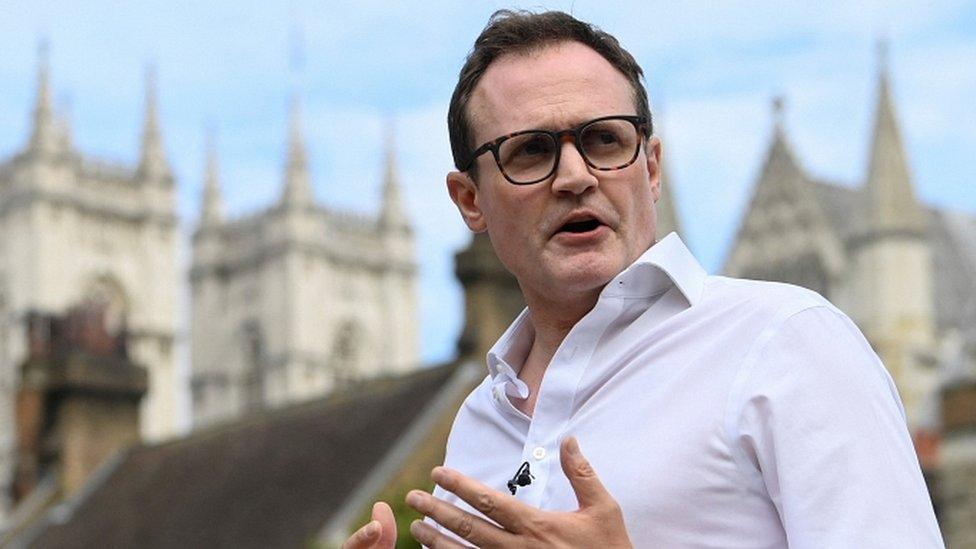Tom Tugendhat: From wars in Iraq and Afghanistan to front line at Westminster
- Published

Like some of the other contenders, Tom Tugendhat was not a name widely known to the British public when the Conservative leadership race began.
MP for Tonbridge and Malling in Kent since 2015, he was the only person to make it through to the final five contenders not to hold ministerial office.
But the former army officer was knocked out in the third round of voting, having received 31 votes.
Mr Tugendhat has cultivated a reputation at Westminster for holding the government to account for its conduct of foreign affairs from Afghanistan to Ukraine in his role as chairman of the foreign affairs select committee.
His criticisms have often been regarded as carrying extra weight because of his role as an officer in the Territorial Army, seving in both the Iraq and Afghanistan conflicts, where he was involved in several front line operations.
Before entering politics, he also worked as a journalist and as a public relations consultant in Lebanon. Back in the UK he was a management consultant and an adviser to the Chief of the Defence Staff.
Mr Tugendhat, who is 49, was born in Westminster, the son of a High Court judge and his French wife. He is a nephew of Conservative peer Christopher Tugendhat, a former vice-president of the European Commission.
He holds dual British and French citizenship. His wife is a French judge and senior civil servant.
He was educated at a private school and studied theology at Bristol University, before completing a Master's degree in Islamic studies at Cambridge and learning Arabic in Yemen.
'One Nation Tory'
In Parliament, he's a member of the One Nation group of Conservative MPs, who see themselves as socially liberal centrists.
In the Brexit referendum, Mr Tugendhat voted to remain in the European Union. He later backed the withdrawal agreement negotiated by Theresa May on each of the three occasions it was put to a vote.
He was highly critical of the Nato withdrawal from Afghanistan in August 2021. As Kabul fell to the Taliban and Western countries scrambled to evacuate their nationals and Afghans who had helped them, Mr Tugendhat described what was happening as Britain's "biggest foreign policy disaster since Suez".
Tugendhat: I haven't slept much since Taliban takeover
He has been hawkish on a number of foreign policy issues - accusing Iran of arming terrorists around the world and advocating stronger action against Russia even before its invasion of Ukraine.
He has been particularly critical of China. In 2020, he co-founded the China Research Group of mainly Conservative MPs to gain a "better understanding of China's economic ambitions and global role".
Pressure from the group helped persuade the government to change its mind about allowing the Chinese telecoms firm Huawei to have a role in the UK's 5G wireless networks.
In March 2021, Mr Tugendhat was one of five MPs to be sanctioned by China for spreading what it called "lies and disinformation". He was later banned from entering China.
'Security before bean counters'
He has often had a strained relationship with Boris Johnson and backed Michael Gove in the 2019 Tory leadership contest.
During the current leadership campaign, Mr Tugendhat has promised to cut national insurance, to reduce fuel duty by 10p a litre and to increase tax incentives for business investment,
He has pledged to increase spending on defence to 3% of national income, saying national security must come before "bean counters and spreadsheets".
In common with the other candidates, he has said he would retain the government's policy of sending some asylum seekers to Rwanda, despite fierce opposition from campaigners.
"The Rwanda solution is not one anyone would have initially chosen, but the reality is you cannot have rewards for criminality and illegal action," he said.
In the first ballot of Tory MPs, M Tugendhat secured 37 votes. That fell to 32 votes in Thursday's second round.